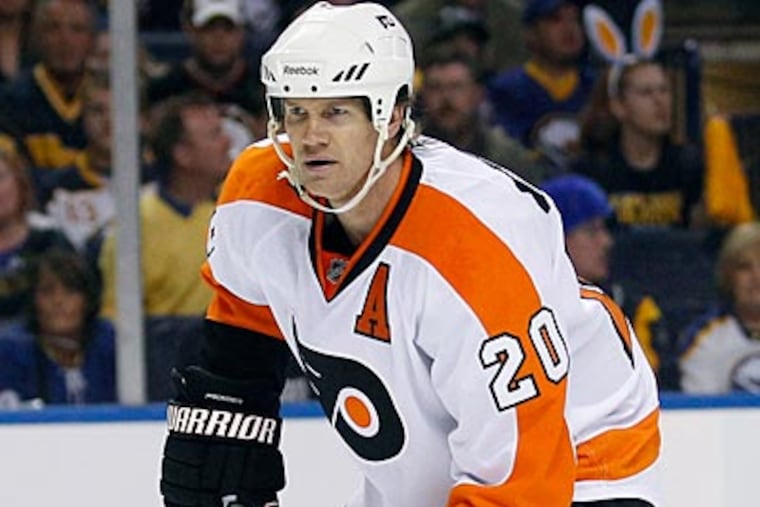Pronger: Be patient with Flyers captain Richards
Chris Pronger is just as concerned with Mike Richards' back as he is his own. Pronger's back issues are medical. Richards' are figurative.

Chris Pronger is just as concerned with Mike Richards' back as he is his own.
Pronger's back issues are medical. Richards' are figurative.
In the wake of the Flyers' disappointing, second-round sweep at the hands of the Boston Bruins, a lot of chatter has taken place as to whether Richards is best suited to be the Flyers' captain. Pronger, who knows a thing or two about the demands and rewards of NHL captaincy, jumped to Richards' defense. Well, Pronger is 2 weeks removed from back surgery, so he didn't actually jump, but you get the idea.
When a season ends in disappointment, "the people that get criticized are your captain and your goalie and all the way down the line," said Pronger, who played in only three of the Flyers' 11 playoff games because of back and wrist injuries. "This is a team sport and for you to be successful in this, you need everybody to play well. Whether it's 'Richie', 'Carts', myself, 'Boosh', 'Bob', it's not just one guy. People can say whatever they want about Richie, but at the end of the day you have to realize it's a team sport."
After games, Richards generally addresses the media - which usually is simply seeking the same answers (win or lose) as the customers who just plunked down $120 for a seat and parking. But he's not known as the kind of guy who will rile up teammates either through confrontation or passionate speeches.
Pronger was 22 when Mike Keenan made him the captain of the St. Louis Blues in 1997. Three years later, he was the NHL's most valuable player. Where Pronger is gregarious and sometimes surly, Richards is more soft-spoken and reserved. Ever notice how uncomfortable he looks in those BMW commercials? Standing in front of questioners and cameras isn't his thing. At least not yet, says Pronger.
"This is on-the-job training. I was brought in to help him be a captain and do all the rest of that," said Pronger, acquired in a trade with Anaheim in the summer of 2009. "I think when I got here, he was 24. He's now 26. I think he's made some strides. But everybody does things their own way. I wasn't always this vocal or patient with the media. It takes time. You have to have that experience. It's not easy."
Pronger captained the Blues for eight seasons and got to the conference finals once (2001). Richards has been the Flyers' captain for three seasons and helped them get to last year's Stanley Cup finals, so technically he's ahead of the pace set by Pronger, considered one of the leaders in hockey. But this is Philadelphia, where champions walk together forever and everybody else is just part of the drought.
"I went through [ups and downs] as a young captain; getting booed, getting mouthed off and wanting to fight guys after games and all the rest of it," Pronger continued. "It's not easy, especially on a team when expectations are this high and fans are this passionate and the media is trying to get the scoops.
"It's not easy. I think as his career progresses, he's going to understand more and more what the media's job is and to just give you guys just a little taste [of information]. You don't have to give it all, but just enough that you guys can do your job and leave him alone. That's all experience. I think it's a little ridiculous for people to be blaming one person."
On the injury front
Pronger said the back surgery he had brought immediate relief of the shooting pains he was experiencing. He could not, however, offer a timetable for when he will be able to skate.
"It's just a matter of how the nerves regenerate, the range of motion [returns] and all the rest of that stuff," said Pronger, who turns 37 on Oct. 10. "It's probably going to be another 4 to 5 weeks before we see where that's at."
Pronger will have a checkup in 2 to 3 weeks. He said the surgery was necessary for him to resume his career. At what level he returns, remains to be seen.
"Like anything else, especially with the back, there's no guarantees," he said. "Everybody recovers differently. You hope that you are able to recover 100 percent, but that's never a guarantee and you never know. It's still very early. I won't know that until training camp [mid-September] or maybe even further down. Who knows?"